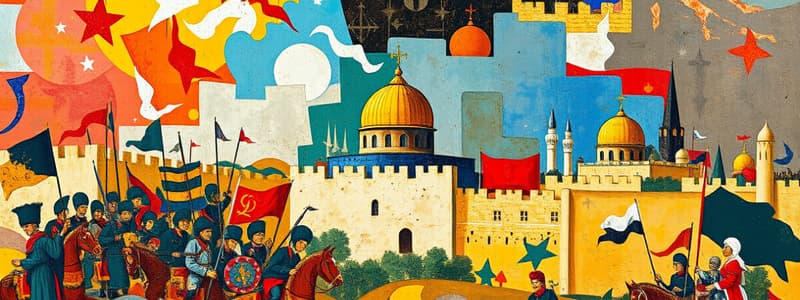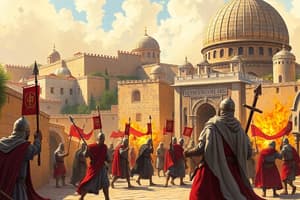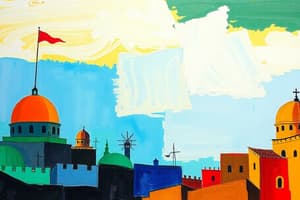Podcast
Questions and Answers
The Crusades began in the eleventh century and were initiated by the Catholic Church to reclaim ______ from Muslim conquerors.
The Crusades began in the eleventh century and were initiated by the Catholic Church to reclaim ______ from Muslim conquerors.
Jerusalem
Some later Crusades aimed at gaining ______ or increasing access to important trade routes.
Some later Crusades aimed at gaining ______ or increasing access to important trade routes.
wealth
The purpose of the Northern, or Baltic, Crusades was to convert non-______ in northern Europe.
The purpose of the Northern, or Baltic, Crusades was to convert non-______ in northern Europe.
Christians
Overall, the Crusades were not military ______.
Overall, the Crusades were not military ______.
The interactions during the Crusades led to important changes that transformed the cultural and political landscape of ______.
The interactions during the Crusades led to important changes that transformed the cultural and political landscape of ______.
Italian cities grew in power as they provided ______ to the established crusader states.
Italian cities grew in power as they provided ______ to the established crusader states.
The sacking of Constantinople contributed to the split between the Eastern Orthodox Church and the ______ Church.
The sacking of Constantinople contributed to the split between the Eastern Orthodox Church and the ______ Church.
The legacies of the Crusades can still be felt in the political and cultural history of the ______.
The legacies of the Crusades can still be felt in the political and cultural history of the ______.
In the late eleventh century, western European warriors had preconceived ideas about the __________.
In the late eleventh century, western European warriors had preconceived ideas about the __________.
The warriors believed that the Muslims intended to conquer the whole of __________.
The warriors believed that the Muslims intended to conquer the whole of __________.
Pope Urban encouraged people to join the Crusade by saying that those who do not take up the way of the __________ may not save their souls.
Pope Urban encouraged people to join the Crusade by saying that those who do not take up the way of the __________ may not save their souls.
Urban spoke eloquently, stating that believers should endure much __________ for the name of Christ.
Urban spoke eloquently, stating that believers should endure much __________ for the name of Christ.
Many Franks had crosses sewn onto their __________ to show their commitment to the Crusade.
Many Franks had crosses sewn onto their __________ to show their commitment to the Crusade.
The First Crusade ended with the European capture of __________.
The First Crusade ended with the European capture of __________.
Fulk of Chartres described the events leading up to the city's fall in his account titled __________.
Fulk of Chartres described the events leading up to the city's fall in his account titled __________.
The siege involved constructing a __________ to breach the city wall.
The siege involved constructing a __________ to breach the city wall.
The defenders of the wall were unable to remain near the place due to the flames and __________.
The defenders of the wall were unable to remain near the place due to the flames and __________.
When the Franks entered the city, they shouted ‘God help us’ as they began to __________.
When the Franks entered the city, they shouted ‘God help us’ as they began to __________.
Upon seeing the flag planted on the wall, the __________ felt demoralized and fled.
Upon seeing the flag planted on the wall, the __________ felt demoralized and fled.
The conflict resulted in thousands of __________ being killed in the temple.
The conflict resulted in thousands of __________ being killed in the temple.
The report indicated that neither women nor __________ were spared during the attack.
The report indicated that neither women nor __________ were spared during the attack.
The __________ of Jerusalem was marked by extreme brutality toward both defenders and civilians.
The __________ of Jerusalem was marked by extreme brutality toward both defenders and civilians.
Pope Urban’s call for the Crusade included the notion that divine mercy would provide for those lacking __________.
Pope Urban’s call for the Crusade included the notion that divine mercy would provide for those lacking __________.
Krey, eds., was published in the year ______.
Krey, eds., was published in the year ______.
The term ______ refers to individuals who are discouraged and without hope.
The term ______ refers to individuals who are discouraged and without hope.
Crusaders constructed a ______ and a bridge for their assault on Jerusalem.
Crusaders constructed a ______ and a bridge for their assault on Jerusalem.
The attackers were unaware that many of Jerusalem's inhabitants were ______.
The attackers were unaware that many of Jerusalem's inhabitants were ______.
In Spain, the Christian reconquest led to a significant ______ in the political and cultural direction of the region.
In Spain, the Christian reconquest led to a significant ______ in the political and cultural direction of the region.
Superficial changes often imply that they are only ______ and not profound.
Superficial changes often imply that they are only ______ and not profound.
The expulsion refers to the act of forcing someone or something's ______.
The expulsion refers to the act of forcing someone or something's ______.
Many indigenous populations experienced significant ______ due to the Crusades.
Many indigenous populations experienced significant ______ due to the Crusades.
The pope called for a holy war at the ______ in 1095.
The pope called for a holy war at the ______ in 1095.
Pope Urban II promised that knights participating in the war would have their sins ______.
Pope Urban II promised that knights participating in the war would have their sins ______.
Muslim expansions were ongoing for ______ in the east.
Muslim expansions were ongoing for ______ in the east.
The Crusades had numerous ______ for Muslims, Jews, and Christians.
The Crusades had numerous ______ for Muslims, Jews, and Christians.
The main target of the Crusaders was the city of ______.
The main target of the Crusaders was the city of ______.
In Greece, the Crusades are often seen as the start of a ______ period in their history.
In Greece, the Crusades are often seen as the start of a ______ period in their history.
The phrase 'a revived memory of ______' refers to lingering resentments from past conflicts.
The phrase 'a revived memory of ______' refers to lingering resentments from past conflicts.
Flashcards are hidden until you start studying
Study Notes
Background on the Crusades
- Initiated in the eleventh century aiming to reclaim Jerusalem from Muslim control.
- Later Crusades sought wealth and improved access to trade routes across Europe.
- Not all Crusades focused on the Holy Land; the Baltic Crusades aimed to convert non-Christians in Northern Europe.
- Generally, the Crusades were poor military successes but fostered increased cultural interactions between Europeans and Muslims.
- Enhanced trade led to the rise of Italian cities, which laid the groundwork for the Renaissance.
- The sacking of Constantinople by Western allies deepened the schism between Eastern Orthodox and Catholic Churches.
- Crusades left significant political and cultural legacies still felt today.
Historical Context
- Prior clashes existed between Christians and Muslims before the Crusades, with military engagements throughout the regions.
- Islam historically encompassed vast territories, including parts of Europe and Africa.
- Key battles, such as Charles Martel's defeat of a Muslim army at Poitiers in 732, influenced Christian perceptions of Muslims.
- Epic poetry shaped Western European warriors' understanding, depicting Muslims as both brave warriors and potential threats to Christendom.
Recruitment for the First Crusade
- Pope Urban II's sermons inspired participation through religious motivations and promises of salvation.
- Urban emphasized the moral duty to suffer for Christ, assuring heavenly rewards for crusaders.
- Many warriors chose to don crosses on their clothing as a sign of their commitment to the cause.
The Fall of Jerusalem
- The First Crusade culminated in the brutal capture of Jerusalem, marked by significant violence against Muslim defenders.
- Witness accounts, notably by Fulk of Chartres, detail besiegement tactics, including the construction of towers and bridges to breach city walls.
- Following the conquest, widespread killing ensued, with indiscriminate violence against the captured populace, including Christians.
Long-term Impact of the Crusades
- The Crusades drastically altered political dynamics in regions like Spain and the Baltic.
- In Spain, the Christian reconquest redirected cultural and political developments.
- The Christianization of areas in the Baltic redefined local identities within the Latin Christian framework.
- In Greece, Western occupation led to lasting negative impacts on local populations, viewed as brutal and superficial.
- Post-Crusades, the systematic destruction of ports by the sultans of Egypt eliminated prospects for future Western incursions, fostering lasting resentment and bitterness in memory among affected populations.
General Observations
- The Crusades influenced European trade patterns, cultural exchanges, and perceptions of Islam, establishing a foundation for future interactions and conflicts.
- The complicated legacy of the Crusades is evident in both historical accounts and the long-standing tensions they exacerbated between cultures.
Studying That Suits You
Use AI to generate personalized quizzes and flashcards to suit your learning preferences.




